非谓语动词(教师用)
- 格式:pdf
- 大小:113.79 KB
- 文档页数:5
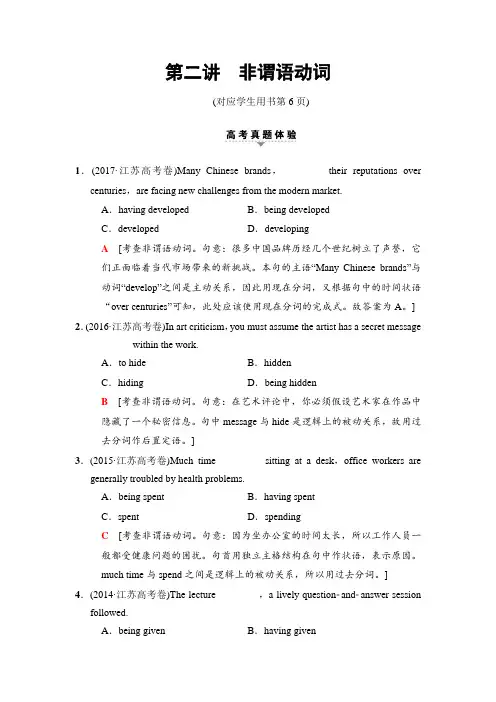
第二讲非谓语动词(对应学生用书第6页)1.(2017·江苏高考卷)Many Chinese brands,________ their reputations over centuries,are facing new challenges from the modern market.A.having developed B.being developedC.developed D.developingA[考查非谓语动词。
句意:很多中国品牌历经几个世纪树立了声誉,它们正面临着当代市场带来的新挑战。
本句的主语“Many Chinese brands”与动词“develop”之间是主动关系,因此用现在分词,又根据句中的时间状语“over centuries”可知,此处应该使用现在分词的完成式。
故答案为A。
] 2.(2016·江苏高考卷)In art criticism,you must assume the artist has a secret message ________ within the work.A.to hide B.hiddenC.hiding D.being hiddenB[考查非谓语动词。
句意:在艺术评论中,你必须假设艺术家在作品中隐藏了一个秘密信息。
句中message与hide是逻辑上的被动关系,故用过去分词作后置定语。
]3.(2015·江苏高考卷)Much time ________ sitting at a desk,office workers are generally troubled by health problems.A.being spent B.having spentC.spent D.spendingC[考查非谓语动词。
句意:因为坐办公室的时间太长,所以工作人员一般都受健康问题的困扰。
句首用独立主格结构在句中作状语,表示原因。
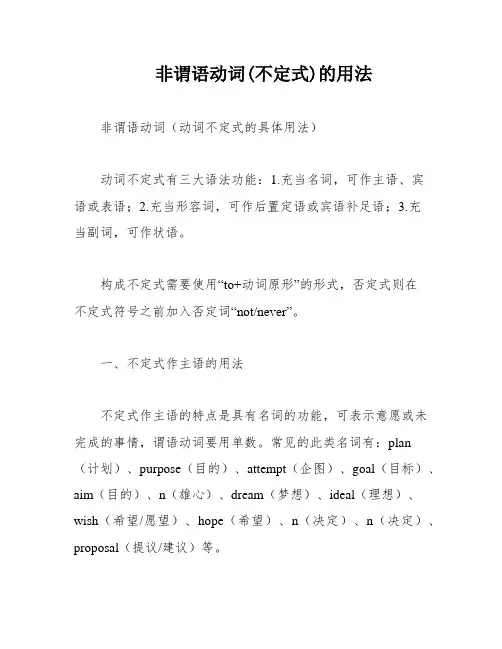
非谓语动词(不定式)的用法非谓语动词(动词不定式的具体用法)动词不定式有三大语法功能:1.充当名词,可作主语、宾语或表语;2.充当形容词,可作后置定语或宾语补足语;3.充当副词,可作状语。
构成不定式需要使用“to+动词原形”的形式,否定式则在不定式符号之前加入否定词“not/never”。
一、不定式作主语的用法不定式作主语的特点是具有名词的功能,可表示意愿或未完成的事情,谓语动词要用单数。
常见的此类名词有:plan(计划)、purpose(目的)、attempt(企图)、goal(目标)、aim(目的)、n(雄心)、dream(梦想)、ideal(理想)、wish(希望/愿望)、hope(希望)、n(决定)、n(决定)、proposal(提议/建议)等。
为了避免主语过长,不定式短语可放在句末,用形式主语“it”代替原来的主语位置,不定式则成为真正的主语。
例如:___.(赢得冠军是我的雄心。
)To master a foreign language is necessary.(掌握一门外语是有必要的。
)To e President of the United States used to be my goal.(过去我的梦想是成为美国总统。
)Speaking perfect English is always my dream.(说一口流利的英语一直是我的梦想。
)It is ___.(保护环境是有必要的。
)There are two special ___:1) It is + adj + of sb + to do sth.2) It is + adj + for sb + to do sth.___ characteristics and differences are:1) If ___ characteristics or traits。
the logical subject of the ___ "of."Examples:It is very affable of you to help me。

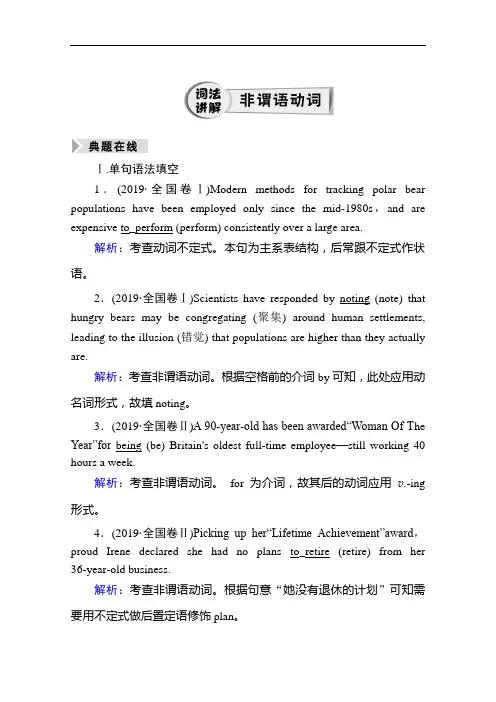
Ⅰ.单句语法填空1.(2019·全国卷Ⅰ)Modern methods for tracking polar bear populations have been employed only since the mid-1980s,and are expensive to_perform (perform) consistently over a large area.解析:考查动词不定式。
本句为主系表结构,后常跟不定式作状语。
2.(2019·全国卷Ⅰ)Scientists have responded by noting (note) that hungry bears may be congregating (聚集) around human settlements, leading to the illusion (错觉) that populations are higher than they actually are.解析:考查非谓语动词。
根据空格前的介词by可知,此处应用动名词形式,故填noting。
3.(2019·全国卷Ⅱ)A 90yearold has been awarded“Woman Of T he Year”for being (be) Britain's oldest full-time employee—still working 40 hours a week.解析:考查非谓语动词。
for为介词,故其后的动词应用v.-ing 形式。
4.(2019·全国卷Ⅱ)Picking up her“Lifetime Achievement”award,proud Irene declared she had no plans to_retire (retire) from her 36-year-old business.解析:考查非谓语动词。

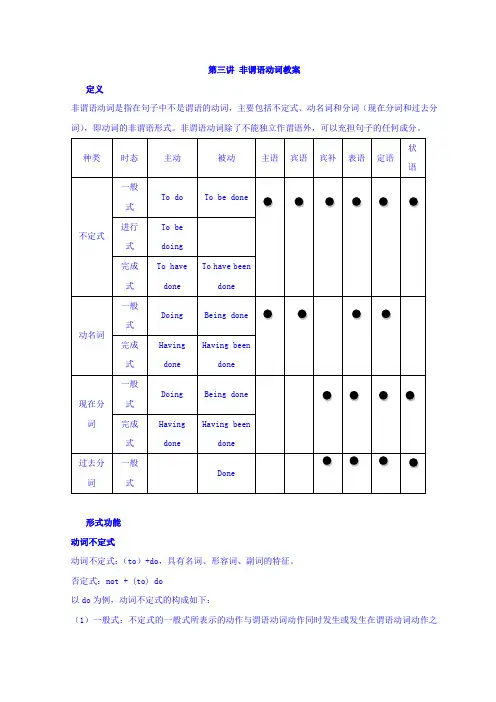
第三讲非谓语动词教案定义非谓语动词是指在句子中不是谓语的动词,主要包括不定式、动名词和分词(现在分词和过去分词),即动词的非谓语形式。
非谓语动词除了不能独立作谓语外,可以充担句子的任何成分。
形式功能动词不定式动词不定式:(to)+do,具有名词、形容词、副词的特征。
否定式:not + (to) do以do为例,动词不定式的构成如下:(1)一般式:不定式的一般式所表示的动作与谓语动词动作同时发生或发生在谓语动词动作之后.例如:I'm nice to meet you. 很高兴见到你。
He seems to know a lot. 他看起来懂得很多。
(2)进行式:不定式的进行式所表示的动作与谓语动词动作同时发生,例如:The boy pretended to be working hard. 男孩假装工作得很努力。
He seems to be reading in his room. 看起来他正在他的房间里面读书。
(3)完成式:不定式的完成式表示的动作发生在谓语动词动作之前,例如:I regretted having told a lie. 我后悔我说谎了。
I happened to have seen the film. 我偶然看过这部电影。
不定式的句法功能:作主语:To finish the work in ten minutes is very hard. 十分钟之内完成这项工作是很难的。
动词不定式短语作主语时,常用it作形式主语,真正的主语不定式置于句后,例如上面两句可用如下形式:It is very hard to finish the work in ten minutes. 十分钟之内完成这项工作是很难的。
It means failure to lose your heart. 灰心意味着失败。
常用句式有:1、It + be+名词+to do 2、It takes sb.+some time+to do 3、It+be+形容词+of sb +to do。

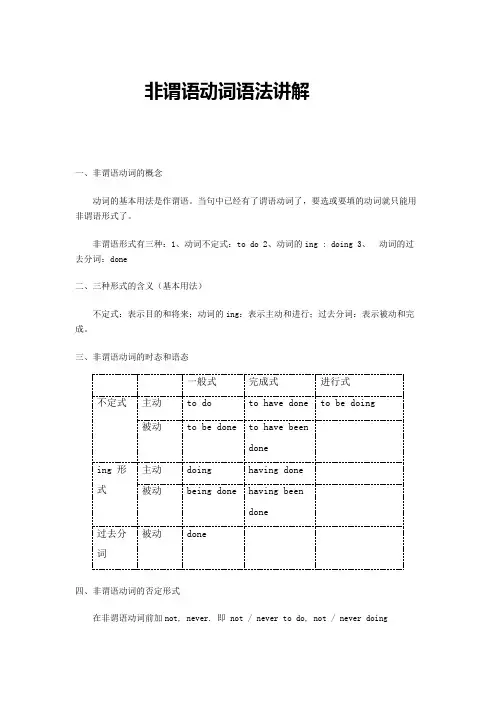
非谓语动词语法讲解一、非谓语动词的概念动词的基本用法是作谓语。
当句中已经有了谓语动词了,要选或要填的动词就只能用非谓语形式了。
非谓语形式有三种:1、动词不定式:to do 2、动词的ing : doing 3、动词的过去分词:done二、三种形式的含义(基本用法)不定式:表示目的和将来;动词的ing:表示主动和进行;过去分词:表示被动和完成。
三、非谓语动词的时态和语态一般式完成式进行式不定式主动to do to have done to be doing被动to be done to have beendoneing 形式主动doing having done 被动being done having beendone过去分词被动done四、非谓语动词的否定形式在非谓语动词前加not, never. 即 not / never to do, not / never doing五、非谓语动词的复合结构不定式的复合结构:for / of sb. to do sth.动词 ing 形式的复合结构:宾格或所有格+doing (-ing 形式作主语时,用的所有格+doing)六、非谓语动词的做题步骤1、判定是否用非谓语形式。
方法:看看句子中是否已有了谓语动词了2、找非谓语动词的逻辑主语。
方法:非谓语动词的逻辑主语一般是句子的主语。
3、判断主被动关系。
方法:非谓语动词与其逻辑主语的主动还是被动关系。
4、判断时间关系。
方法:分析句子,看看非谓语动词所表示的动作发生在谓语动作之前、之后还是同时。
之前常用 done; 之后常用to do; 同时常用doing.学习非谓语形式时,建议把三种形式一起来比较学习,会更加有效一些。
七、非谓语动词作主语和表语的比较1、不定式和动名词作主语和表语a. 不定式表示一次性的、具体的动词。
动词ing 常表示一般的、泛指的或习惯性的动作。
如:________ is a good form of exercise for both young and old.A. The walkB. WalkingC. To walkD. Walk(分析) a good form 暗示泛指一般的行为,用动名词作主语,选 Bb. 不定式作主语时,常用it 作形式主语,即用句型:It is + adj. / n. + (for / of sb. ) to do sth.It’s important for us to learn English well.It’s kind of you to help us.注意:下面几个句型是用动名词:It’s no good / use doing sth.It’s usel ess doing sth.There is no need to do sth.2、不定式、动名词、分词作表语的比较1、不定式、动名词作表语,.表示主语的内容。
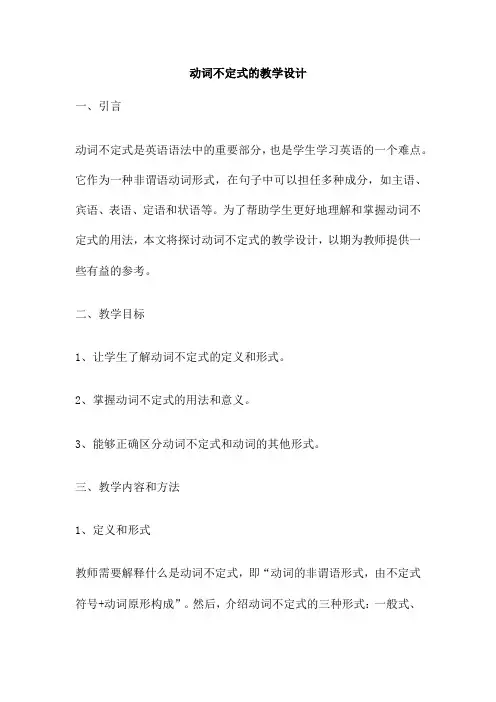
动词不定式的教学设计一、引言动词不定式是英语语法中的重要部分,也是学生学习英语的一个难点。
它作为一种非谓语动词形式,在句子中可以担任多种成分,如主语、宾语、表语、定语和状语等。
为了帮助学生更好地理解和掌握动词不定式的用法,本文将探讨动词不定式的教学设计,以期为教师提供一些有益的参考。
二、教学目标1、让学生了解动词不定式的定义和形式。
2、掌握动词不定式的用法和意义。
3、能够正确区分动词不定式和动词的其他形式。
三、教学内容和方法1、定义和形式教师需要解释什么是动词不定式,即“动词的非谓语形式,由不定式符号+动词原形构成”。
然后,介绍动词不定式的三种形式:一般式、进行式和完成式。
2、用法(1)主语:不定式可以作主语,例如:“To learn English is difficult.”(学英语很难)。
(2)宾语:不定式可以作宾语,例如:“I want to go home.”(我想回家)。
(3)表语:不定式可以作表语,例如:“My dream is to become a doctor.”(我的梦想是成为一名医生)。
(4)定语:不定式可以作定语,例如:“He has a lot of homework to do.”(他有很多作业要做)。
(5)状语:不定式可以作状语,例如:“To be honest, I don’t know the answer.”(说实话,我不知道答案)。
3、与其他形式的区别(1)不定式与动名词的区别:不定式表示将来,动名词表示过去或现在。
例如:“I like to swim”(我喜欢游泳)和“Swimming is fun”(游泳很有趣)。
(2)不定式与动词原形的区别:不定式具有非谓语性质,不能充当谓语,而动词原形可以充当谓语。
例如:“To see is to believe”(眼见为实)和“See me tomorrow”(明天见我)。
四、教学步骤1、教师介绍动词不定式的定义和形式,并进行简单的例句解释。
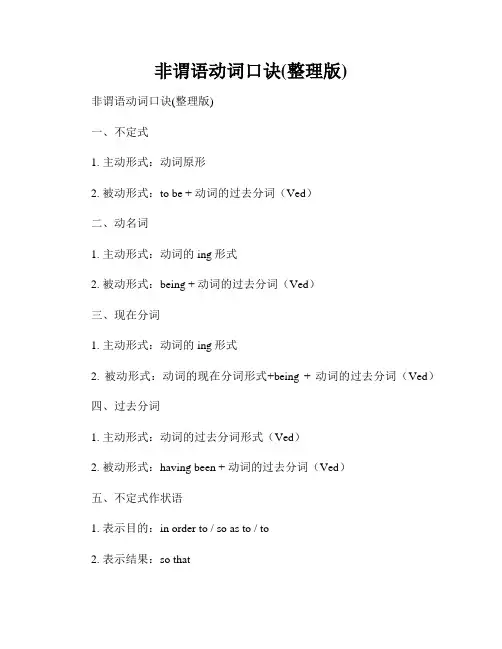
非谓语动词口诀(整理版)非谓语动词口诀(整理版)一、不定式1. 主动形式:动词原形2. 被动形式:to be + 动词的过去分词(Ved)二、动名词1. 主动形式:动词的ing形式2. 被动形式:being + 动词的过去分词(Ved)三、现在分词1. 主动形式:动词的ing形式2. 被动形式:动词的现在分词形式+being + 动词的过去分词(Ved)四、过去分词1. 主动形式:动词的过去分词形式(Ved)2. 被动形式:having been + 动词的过去分词(Ved)五、不定式作状语1. 表示目的:in order to / so as to / to2. 表示结果:so that3. 表示原因:for / to / in order to / so as to4. 表示方式:by / by + 动词的ing形式5. 表示条件:if / provided (that) / unless六、非谓语动词作主语1. 不定式:to do2. 动名词:doing3. 现在分词:doing4. 过去分词:done七、非谓语动词作宾语1. 不定式:动词原形2. 动名词:动词的ing形式3. 现在分词:动词的ing形式4. 过去分词:动词的过去分词形式(Ved)八、非谓语动词作定语1. 不定式:to do2. 动名词:doing3. 现在分词:doing4. 过去分词:done九、非谓语动词作表语1. 不定式:be + 不定式2. 动名词:be + 动词的ing形式3. 现在分词:be + 动词的ing形式4. 过去分词:be + 动词的过去分词形式(Ved)总结:非谓语动词包括不定式、动名词、现在分词和过去分词,分别可以用于不同的语法结构,如状语、主语、宾语、定语和表语等。
掌握非谓语动词的不同形式和用法,对于提高语言表达的准确性和多样性非常重要。
希望以上的口诀能够帮助你记忆和理解非谓语动词的用法。
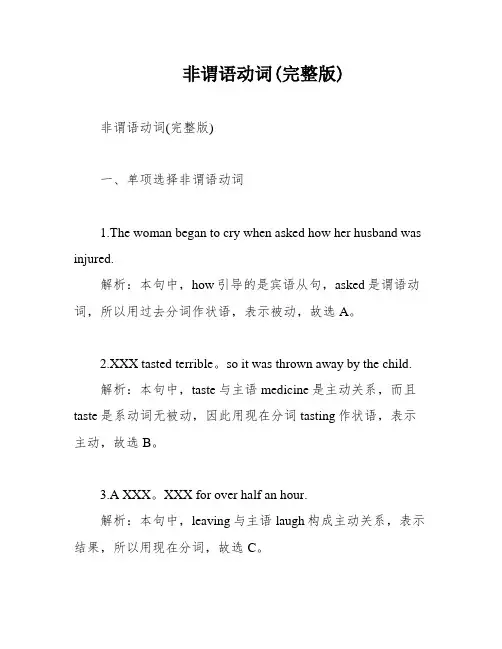
非谓语动词(完整版)非谓语动词(完整版)一、单项选择非谓语动词1.The woman began to cry when asked how her husband was injured.解析:本句中,how引导的是宾语从句,asked是谓语动词,所以用过去分词作状语,表示被动,故选A。
2.XXX tasted terrible。
so it was thrown away by the child.解析:本句中,taste与主语medicine是主动关系,而且taste是系动词无被动,因此用现在分词tasting作状语,表示主动,故选B。
3.A XXX。
XXX for over half an hour.解析:本句中,leaving与主语laugh构成主动关系,表示结果,所以用现在分词,故选C。
4.When asked for his views about his teaching job。
Philip said he found it very interesting and rewarding.解析:本句中,when引导的是省略句,完整的是when he was asked his view about his job as a teacher,这里当从句中的主语与主句的主语一致,并且从句的谓语动词有be时,这时从句的主语与be同时省略,故选B。
二、改写句子1.Being asked how her husband was injured。
XXX.2.XXX.3.A XXX for over half an hour.4.Philip found XXX when he was asked for his views about it.1.The company has decided to implement a new policy to ce the use of plastic bags。
教案:非谓语动词作定语一、教学目标1. 让学生理解非谓语动词的概念及作用。
2. 培养学生正确运用非谓语动词作定语的能力。
3. 提高学生对英语语法知识的综合运用能力。
二、教学内容1. 非谓语动词的分类:动词不定式、分词、动词-ing。
2. 非谓语动词作定语的用法及注意事项。
三、教学重点与难点1. 重点:非谓语动词作定语的用法。
2. 难点:区分不同非谓语动词作定语时的用法及注意事项。
四、教学方法1. 实例分析法:通过举例让学生了解非谓语动词作定语的用法。
2. 练习法:设计相关练习题,让学生在实践中掌握非谓语动词作定语的技巧。
3. 讨论法:分组讨论,引导学生总结非谓语动词作定语的规律。
五、教学过程1. 导入:简要介绍非谓语动词的概念,引导学生关注非谓语动词作定语的用法。
2. 讲解:讲解非谓语动词作定语的用法及注意事项,举例说明。
3. 练习:设计练习题,让学生运用所学知识进行分析、判断和修改。
4. 讨论:分组讨论,让学生总结非谓语动词作定语的规律。
5. 总结:对本节课的内容进行归纳总结,强调重点和难点。
6. 作业布置:布置相关练习题,巩固所学知识。
教学评价:通过课堂表现、作业完成情况和练习题的正确率来评价学生的学习效果。
六、教学案例分析1. 案例一:分析句子"A beautiful pnting hanging on the wall" 中非谓语动词"hanging" 的作用和意义。
2. 案例二:分析句子"The girl sitting next to me is my sister" 中非谓语动词"sitting" 的作用和意义。
七、课堂互动环节1. 学生分组,每组选择一个非谓语动词作定语的例子,分析并解释其用法。
2. 各组汇报分析结果,其他组进行评价和讨论。
3. 教师引导总结非谓语动词作定语的规律和注意事项。
八、拓展练习1. 设计一些较复杂的句子,让学生练习使用非谓语动词作定语。
非谓语动词公开课教案班级: 602班地点:通用技术教室教师:吴红莲时间: 2014年12月11日一:教学目标:1.让学生了解VIng在句子中的成分2.了解Ving形式变化3.学会运用Ving来补充完整句子二:教与学的方式:学生自主学习、先学后教、课堂讲练结合三:教学步骤:课前:学生先自主学习:本周二晚上分发学案供学生自主学习,可以自己思考也可以请假同学或者查找资料。
尽可能完整看我导学案并能完成导学案中的练习。
上课:步骤一:了解Ving在句子中的成分。
动词不定式、动名词和分词(包括现在分词和过去分词)可以出现在句子中除谓语以外的任何一个位置上,充当句子的主语、宾语、表语、定语、状语、补语等成分,这些动词形式称为非谓语动词。
今天我们谈谈 Ving的用法。
Ⅰ). 作主语Smoking is bad for health. 吸烟对人身体有害。
注意it用作形式主语放于句首的句式** It is no use/good/a waste of time + doing sth.It is no use waiting here.等在这儿是没有用的。
It is a waste of time playing games. 玩游戏是浪费时间的。
It is a waste of time ______________(watch )TV. 看电视是浪费时间。
另外There is no…句型中,常用doing作主语。
There is no saying what will happen. 无法估计将会发生什么事。
There is no use making an excuse for this.为这事编造借口没用。
Ⅱ. 作表语⒈ doing比较抽象笼统的一般行为Her hobby is paiting.My job is looking after the children.My job is ______________(teach).My job is ____________(type) letters and papers.⒉主表一致当主语是doing形式时,表语一般也用doing,如主语是to do,表语一般也用to do Saving is having. =To save is to have. 节约即是收入。
非谓语动词初中语法教案教学目标:1. 理解非谓语动词的概念和用法;2. 掌握非谓语动词的三种形式:动词不定式、动词的-ing形式和动词的过去分词;3. 能够正确运用非谓语动词作主语、宾语和状语;4. 能够辨别和运用非谓语动词的否定式;5. 能够理解非谓语动词的逻辑主语的用法。
教学内容:1. 非谓语动词的概念和分类;2. 非谓语动词的句法功能;3. 非谓语动词的否定式;4. 非谓语动词的逻辑主语。
教学步骤:一、导入(5分钟)1. 引导学生回顾谓语动词的概念和用法;2. 提问:除了谓语动词,还有其他类型的动词吗?3. 引导学生思考并回答:非谓语动词。
二、新课讲解(20分钟)1. 讲解非谓语动词的概念和分类:动词不定式、动词的-ing形式和动词的过去分词;2. 讲解非谓语动词的句法功能:作主语、宾语和状语;3. 讲解非谓语动词的否定式:在动词不定式前加not,在动词的-ing形式和动词的过去分词前加not;4. 讲解非谓语动词的逻辑主语的用法:通过介词for或of引导。
三、例句练习(15分钟)1. 让学生听老师朗读例句,并指出例句中使用的非谓语动词形式;2. 让学生尝试用非谓语动词填空,练习其用法;3. 让学生互相交换答案,并进行讨论和纠正。
四、课堂练习(10分钟)1. 让学生完成练习题,练习非谓语动词的用法;2. 让学生互相交换答案,并进行讨论和纠正。
五、总结和作业布置(5分钟)1. 让学生总结本节课学到的内容;2. 布置作业:让学生运用非谓语动词写一个短文,要求使用非谓语动词作主语、宾语和状语。
教学评价:1. 课后收集学生的作业,评估其对非谓语动词的掌握程度;2. 在下一节课开始时,让学生进行非谓语动词的测试,评估其学习效果。
教学反思:在课后,教师应反思本节课的教学效果,看学生是否掌握了非谓语动词的概念和用法,是否能够正确运用非谓语动词作主语、宾语和状语,以及是否能够辨别和运用非谓语动词的否定式和逻辑主语。
非谓语动词讲解超全非谓语动词是指不具有人称和数的动词形式,不需要依附主语就可以使用的动词形式。
非谓语动词包括动词不定式、动名词和现在分词等形式。
非谓语动词的使用可以丰富句子结构,增强表达效果,表达出动作的进行、完成、目的、原因等不同的语义关系。
一、动词不定式动词不定式是动词的一种非谓语形式,由“to” + 原形动词构成,具有名词、形容词或副词的特性。
1. 作主语:To learn English well is my goal.(学好英语是我的目标。
)2. 作宾语:I want to take a nap.(我想睡个觉。
)3. 作宾补:She found it difficult to solve the math problem.(她发现解决这个数学问题很困难。
)4. 作表语:My dream is to become a teacher.(我的梦想是成为一名教师。
)5. 作状语:He left the room to make a phone call.(他离开房间去打电话。
)二、动名词动名词是动词的一种非谓语形式,多用于表示动作的稳定状态或被动的形式,常常作主语、宾语或介词的宾语。
1. 作主语:Swimming is my favorite sport.(游泳是我最喜欢的运动。
)2. 作宾语:I enjoy reading books.(我喜欢阅读书籍。
)3. 作宾补:He kept silent, not wanting to reveal the secret.(他保持沉默,不想泄露秘密。
)4. 作介词的宾语:She is good at playing the piano.(她擅长弹钢琴。
)三、现在分词现在分词是动词的一种非谓语形式,通常以-ing结尾,可以表示主动、进行、伴随等含义。
1. 作定语:The running dog scared the child.(奔跑的狗吓唬了孩子。
名思教育个性化辅导教案学生:胡蝶年级:高一班主任:张梦实日期:时段:教师:眭彬彬课题非谓语动词的用法教学目标 1.了解非谓语动词的分类,及其在句中担任的成分。
2.掌握每一类非谓语动词的形式,作用,结构和考点重难点透视1、掌握分词、动名词在句子中的作用2、区分动名词、分词作定语和状语的异同3、掌握、动名词作宾语,不定式和分词作宾补的惯用结构4、注意非谓语动词与句子谓语动词的时间关系,以确定非谓语动词的时态形式5、弄清非谓语动词与其逻辑主语的关系,以确定非谓语动词的语态形式考点 1.不定式与动名词,动名词与现在分词,现在分词与过去分词,分词作状语与独立用法对比。
2.动名词在及物动词后作宾语的区别是考查的热点。
3.过去分词作定语,不定式和分词作宾语补足语的用法。
知识点剖析序号知识点预估时间掌握情况1 动名词2 分词3 知识巩固4.教学内容一、分词(一)分词的作用分词在句中可以作定语、表语、状语和宾语补足语。
例如: 1.作定语 Do you know the boy standing at the gate? Have you read the book writtenby Lu Xun?2.作表语 We are excited at the news. The news he told us is exciting.3.作宾语补足语 I heard him singing a song in the classroom. We found the ground covered with snow.4.作状语 While lying in bed, he listened to some music. Seen from the hill, the village looks move beautiful. 分词作状语时,它的逻辑主语就是句子的主语,否则分词前面必须有自己的主语。
(二)分词的时态现在分词分一般式和完成式,而过去分词则没有时态形式的变化。
非谓语动词(教师用)【教学内容】1.动词+-doing: 动名词 1. like/love/enjoy/hate doing 2. practice doing 3. have (great/ a lot of)fun doing 4. begin/start doing 5. mind (one’s) doing 6. find/hear /see sb. Doing 7. spend … doing 8. remember/ forget doing 9. finish doing 10. stop doing 11. keep (sb.) doing【介词+ doing】: 1.how/what about doing 2. thanks for doing 3. think about/of doing 4. complain about doing5. be good at doing 6. do well in doing 7. make a living (by) doing 8. be interested in doing 9. have a hard time (in) doing 10. have (no) problem (in) doing 11. feel like doing 12. instead of doing 2. 动词+–to do: 1. want/would like to do 2. decide to do 3. like/love/hate to do 4. ask/tell sb. to do 5. stop to do 6. hope to do 7. fail to do 8. happen to do9. be supposed to do 10. allow sb. to do 11. try (one’s best) to do 12.seem to do13. remember/ forget to do 14. need to do15. be able to do 16. take care/ be careful to do 17. choose to do【带to do 的句型】:1. It’s time to do 2. It takes sb. some time/money to do3. too… to do 4. It is/ was + adj. (+for/ of sb.) + to do 5. (not) .. enough to do 6. the first/last one to do【带do的句型】: 1. Why not/ Why don’t you do 2. You’d better do 3. would do … rather than do…
专项练习:用所给动词的正确形式填空。1. Mr. Chen enjoys __________(drink) tea but hates__________(eat ) pizza.2. Let’s __________(talk) about Jay’s concert.3. Would you like _________(have) some dumplings?4. Mom asks me _________(do) my homework first.5. Kim isn’t good enough ___________(pass) the competition.6. Jack keeps __________(play) sports for many years.7. I found Helen ___________(sing) under the tree.8. Children often complain about ____________(do) too much homework.9. Dale likes ___________(play) the guitar, but he isn’t good at__________(play) it.10. --Don’t stop ___________(read), Max. --But I want to stop ___________(have) a rest.11. --Did you hear someone __________(walk) by just now? – No, I didn’thear anything.12. We are happy ___________(see) each other again after ten years.13. You’d better ____________(not cross) the road alone.14. It’s very kind of you ____________(help) me ____________(make)dinner.15. He seems ___________(argue) with his grandmother.
II.选择填空。1. Would you please ____ the door for me?a. holding b. not to hold c. hold d. held2. Seeing an old man getting off the train, she hurried over ____ thingsfor him.a carrying b. to carry c. carried d. for carrying3. We’d really like you ____ to the party tonight.a. come b. to come c. will come d. should come4. We can do nothing but ____ the experiment.a. to repeat b. repeat c. repeating d. repeated5. Have you got any thing ____ about this matter?a. saying b. to say c. said d. say6. He was not ____ try it again.a. such a fool as to b. so a fool as to c. a fool such as to d. a fool so as to7. He was too excited ____.a. to go to sleeping b. to slept c. to go to sleep d. going to sleep14. She keeps telling us ____. a. what to do b. doing what c. what is doing d. do what19.I haven’t decided which hotel ____. a. to stay b. is to stay at c. to stay at d. is for staying20.I was almost asleep when I heard someone ____ at the door. a. knock b. to knock c. knocked d. being knocked21.I often spent much money ____ books. a. to buy b. buying c. on buying d. for buying22.If you practice ____ English whenever you can, you will soon speak well. a. talking b. going speak c. speaking d. to speak24.She usually forgets ____ the door, but she remembered ____ it yesterday.a. to shut…to shut b. shutting…shutting c. to shut…shutting d. shutting…to shut25.I ____ a bus to school when it was raining.a. am used to take b. used to taking c. use to take d. was used to taking26. I’m thirsty. Will you get me something ____?A. drink B. to drink C. eat D. eating33. He stood there for two hours ____ the game. A. watched B. watching C. is watching D. was watching34. It ____ Jack twenty minutes ____ the math problem yesterday. A. took; to work out B. takes; worked out C. has taken; work out D. is taking; working out
句型转换1. Tom went to Beijing for his holiday last summer. (对划线部分提问)